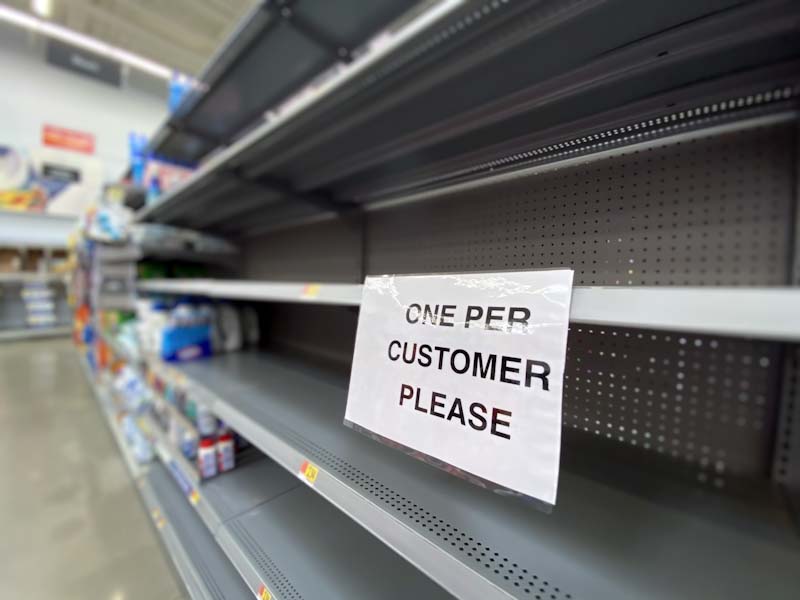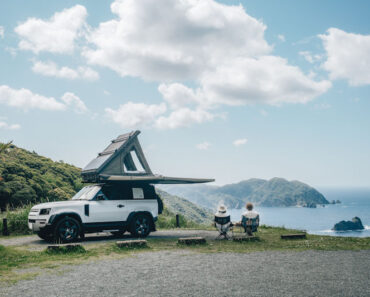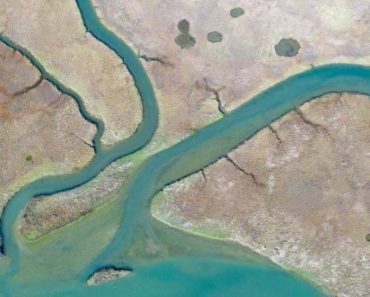Being preppers and survivalists, we know that food is and will always be one of our main concerns in our quest to survive whatever the uncertain future throws at us.
No matter what other people will tell you, food can be both a blessing and a curse in the aftermath of a disaster. Let’s look at how your food can put you in danger when the brown stuff hits the fan and what you should do to handle the food prepping challenges.
The need for food
Food was one of humanity’s greatest possessions, and controlling food resources and stockpiles helped shape our world. Food was the reason why wars were started, and throughout our history, food, or the lack of it, made millions of victims.
In fact, entire civilizations and empires were built on a surplus of food, and the advancement in farming technologies and practices helped build today’s world. But food, as stated before, can also be a curse when it’s in short supply.
Famines have claimed millions of lives and led to the disappearance of entire civilizations. The Mayan famine, from 800–1000 BCE, is one of the oldest recorded events that helped us understand what the lack of food can lead to. Severe drought killed more than a million Mayans and initiated a cascade of internal collapses that eventually led to the demise of their civilization.
In more recent years, we can see that even what we call advanced and developed countries compared to centuries ago can suffer from famine, and one example would be the North Korean famine which is estimated to have killed between two hundred thousand and two and a half million people.
And as I write this article, there are ongoing famines in Ethiopia and Madagascar, and people living in those parts of the world have been struggling with the lack of food since 2020. But most people, especially those living in first-world countries, will never hear about these humanitarian disasters because we have other more pressing matters to deal with, and the scenario of famine affecting our lives is a ridiculous thought at most. Is it, though?
How food can get you killed
The presence or absence of food can kill a person in various ways, and for the sake of this article, we will look at various scenarios in which food can become a hazard for us and our loved ones.
Food spoilage
Food spoilage and food waste are a problem in our country, and we throw in the trash more food than any other country in the world. Having an abundance of food and a wide variety of options for a meal has turned us into a wasteful nation. Now, as preppers, we know that a food stockpile is a crucial part of any emergency preparedness plan, and compared to others, we are (at least some of us) more frugal when it comes to resources.
But even in our case, food can go bad, and there are many reasons that can lead to food spoilage. Natural disasters that leave us without power for weeks, food contamination caused by improper food handling, pest infestation, or food preservation errors are all factors that can cause food spoilage.
When you discover your food stockpile is in peril, your main concern is to establish if your food is still safe to eat and salvage as many food items as possible. Establishing if food is still safe for human consumption requires learning about the signs of food spoilage and what you should do in various circumstances.
For example, do you know how to handle your refrigerated food when the power goes out? If you have your fridge packed with food and the power goes out for days, it’s important to make sure you use all the food you possibly can before it goes bad. Keep a few plastic bottles in the freezer and use them to improvise a cooler, cook the food and package what you can’t eat, and then store it in the basement or any other dark and cool place.
Check out the federal food safety organization (foodsafety.gov) recommendations. They suggest that all your refrigerated food that has been sitting in a place above 40 degrees for more than 2 hours should be discarded. Do a smell and taste test and decide if you should risk consuming that food or if it needs to be thrown away. Perhaps you have other supplies you can use, or perhaps you are forced to eat what’s available.
There are many things that can go wrong with your food supplies, but nothing can incapacitate you faster than eating food that has gone bad.
Earn Your Food Independence NOW
Competing for food
In this great country of ours, there are many families who stuff their fridges and freezers with food to last them for weeks, and they think everything is covered. They do not have a backup food supply, and they assume that food will always be available and within reach. But even our wealthy nation has things to worry about, and hunger is still present in America.
In fact, according to the last estimation, there are currently more than 34 million Americans that are food insecure. Even more troubling is the fact that more than 60% of the entire population doesn’t have enough food to last them for more than 3 days in case they are cut off from their food supply centers.
What this means is that in case something happens that would disrupt the food supply chain, there would be a lot of completion for the available or remaining food. And we’ve all seen how our nation can handle shortages in recent years when the pandemic hit.
People were fighting over basic items like toilet paper, and they were turning on each other while waiting in line to enter the grocery stores. There were cases in which inventories of certain foods were temporarily low, or they were completely unavailable, and it took quite some time until stores were able to restock.

While you can live fine (well, almost fine) without toilet paper, you can’t live for long without food. And when hunger and desperation set in, coupled with the realization that those grocery store shelves won’t be restocked, that’s when all hell breaks loose.
People will fight over food, and they will be competing with each other for whatever’s left, and whatever’s in reach. There’s no telling how this will turn out, but one thing is certain, not everyone will survive it.
You might not be concerned about this because you, just like me and many others out there, have made sure we have enough food stockpiled to last for at least a year. But even people like us are in danger, and it’s something we have to understand; no matter how good we think we have it all covered. Preppers and everyone out there that sits on a stockpile of food will become a target if famine or any disaster leading to food shortage hits this country.
There’s no way you can keep your prepping plans secret since we are social creatures, and we let others in on our plans because we all have people we can trust. However, the problem with trust is that it can be stretched to its limits and beyond when things go south, and words travel fast during times of adversity.
And if and when you become a target, you have only two choices. You stay and fight everyone who comes your way to protect what’s yours, or you leave and try to carry as many supplies as you can, hoping to reach your safe haven.
Those that believe this is a far-fetched scenario should think twice about it, and they should look at what others went through when food became a rare commodity. I’ve been in contact with preppers from Venezuela for years, and I know firsthand what they had to do to procure food.
They’ve told me how they had their pets stolen by their neighbors (to be eaten) and how they had to reinvent their food procuring methods to survive. I have a close friend, Oscar Frederic Gonzales, that is still living in Venezuela, and even if he has had trouble dealing with the situation, he managed to survive it all since he was preparing long before the signs appeared.
Even today, he relies on his food cache to survive, and he drives for a few miles each day to retrieve food items from his cache. Whenever he goes on a food retrieval mission, he uses his truck, and he hides the goods inside. The trick is he carries manure for one of the largest farms in Venezuela, and he hides the items inside the manure since he’s afraid someone might steal them. However, as he states, he is one of the lucky ones, and he still has to live with the inability of his neighbors to procure food, and he constantly feels like he has a target on his back.
Cooking food
Cooking your food can be dangerous, and I’m not talking here about kitchen accidents that lead to house fires, burn injuries or similar accidents. While these can indeed represent a problem for some folks, I’m referring to the need to cook your food when there’s not much to go around. To put it simply, how you prepare and cook your food when staying under the radar.
Those living in urban environments will have a hard time keeping their cooking plans hidden and on schedule since a large population density would always put them at risk of being discovered. Even those living in a rural environment may encounter problems when preparing and cooking their food since the smell of food will be carried over long distances.
You may say that in such a situation, it would be smart to eat only food that needs no cooking, but we can all agree that this is not always an option. Not to mention that eating the same stuff over and over again leads to food or appetite fatigue, and this can become a serious problem in the long run for elders and children.
The solution would be to find ways to cook your food without attracting too much attention and schedule your cooking needs when most people are less active. When it comes to cooking methods, there are various strategies that can be employed, from cooking without fire (like using a solar oven) to concealing the presence of your cooking operation.
Concealing the presence of fire is often required when you need to stay under the radar, and this means that you need to build fire setups that hide the flames (like using a Dakota fire hole) or move the entire cooking operation out of sight (like cooking underground, perhaps in the basement).
Now, the most difficult part would be to hide the smell of food being cooked, and this is almost impossible. While cooking underground will help you conceal most of the smell escaping if you use various filters in conjunction with air purifying devices, there’s no guarantee you will capture all the odors.
One solution would be to cook when all others are less active, and the recommended time would be between 1 AM and 4 AM. During this time, most people are resting, and it’s the phase of the sleep cycle when deep sleep sets in. This means that, unless you make loud noises, those sleeping at those hours will barely wake up.
Procuring food
Procuring food can be challenging during or after a disaster, and how you plan to obtain your food will dictate various courses of action. Most people, regardless if they are preppers or not, think of hunting and fishing when a “post-apocalyptic” scenario is mentioned. However, few actually spend time researching our history and figuring out if that is a feasible scenario or not.
As I’ve mentioned before, there will be a lot of competition for any remaining resource, and the same goes for hunting and fishing. You would need to hunt and fish in remote locations (which may be hard to reach by inexperienced people), or you would need to schedule your hunting and fishing trips so that there’s as little competition as possible.
Not only do you have to make sure there’s no one around, but you also have to employ tactics that would have minimal impact. So using firearms is out of the question when hunting, and staying in one spot or in the middle of a lake while fishing is also not feasible. You will need to use silent tools (like bows and traps), and these require a lot of experience and practice in the field.
Another thing that people mention when food procurement scenarios are discussed is foraging. As a forager with more than 20 years of experience, I can tell you that foraging is a skill that few can master nowadays, and besides being a challenging endeavor, it’s not nearly enough to keep you and yours fed.
First of all, learning how to correctly identify plans during their various growth stage and throughout the changing seasons requires a lot of practice, and second, what you gather will most likely not provide enough nutrition to help you survive for long. I’ve discussed before the challenges of living solely on foraged food, and I advise you to read this article if you want to learn more.
Another food procuring method involves scavenging, but once again, this may not be feasible unless the disaster has reduced some of the competition. However, even if there is little competition, you still need to figure out ways to travel without being noticed, procure various food items without putting yourself at risk, and make sure you can bring everything back without being spotted by others. Scavenging is one of the last options, and you should have other things planned before you resort to it for survival.
Growing your own food is perhaps the easiest food procuring option. Isn’t it?
It may be for those that have experience with growing food from seeds or those living in areas where farming/gardening land is available. For all the rest, it means finding ways to improvise with whatever space they have available and keeping things out of reach. You see, even when growing your own food, there’s still the “competition” issue you need to handle.
And while protecting your food crop from wild animals may be easier, keeping the human element out of your garden can be challenging. I know this for a fact because I’ve discussed with Freddy about this and debated the topic on various occasions. I’ve also learned how they do it in Venezuela and how they had to improvise to protect their gardens.
In his case, he had to get creative and move his garden atop his building since it helped him keep a better eye on it, and at the same time, the crop was out of reach for others. He also managed to organize some sort of a “neighborhood watch” for their gardens, and a lot of his neighbors are now growing food atop their homes.
Their gardens became so successful that they soon attracted attention, and they were forced to hire armed guards to protect their crops when they weren’t at home. Even more, their gardening model is now being used at a larger scale throughout the country, and urban rooftop farms are today a common sight in Venezuela.
Concluding
As you can see, food can become both a blessing and a curse in the aftermath of a disaster, and not having enough of it can lead to dangerous situations. Even if you are one of the lucky ones that sit on a large food stockpile, you still have to figure out ways to protect it and plan for various exit strategies when the hungry ones come knocking.





![Zach Armstrong [PODCAST] | Survival Life Zach Armstrong [PODCAST] | Survival Life](https://survivalcove.com/wp-content/uploads/2022/04/Can-You-Survive-This-Podcast-370x297.jpg)





















